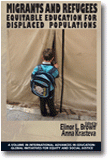
Migrants and Refugees
Equitable Education for Displaced Populations
Edited by:
Elinor L. Brown, University of Kentucky
Anna Krasteva, New Bulgarian University
A volume in the series: International Advances in Education: Global Initiatives for Equity and Social Justice. Editor(s): Elinor L. Brown, University of Kentucky. Rhonda G. Craven, University of Western Sydney. George McLean, Catholic Universities of America.
Published 2013
International Advances in Education: Global Initiatives for Equity and Social Justice is an international research monograph series of scholarly works that primarily focus on empowering students (children, adolescents, and young adults) from diverse current circumstances and historic beliefs and traditions to become non-exploited/non-exploitive contributing members of the global community. The series draws on the research and innovative practices of investigators, academics, and community organizers around the globe that have contributed to the evidence base for developing sound educational policies, practices, and programs that optimize all students' potential. Each volume includes multidisciplinary theory, research, and practices that provide an enriched understanding of the drivers of human potential via education to assist others in exploring, adapting, and replicating innovative strategies that enable ALL students to realize their full potential. This volume provides the reader with promising policies and practices that promote social justice and educational opportunity for the many displaced populations (migrants, asylum-seekers, refugees, and immigrants) around the globe. The volume is divided into four sections that offer: (1) insights into the educational integration of displaced children in industrialized nations, (2) methods of creating pedagogies of harmony within school environments, (3) ways to nurture school success by acknowledging and respecting the cultural traditions of newcomers, and finally (4) strategies to forge pathways to educational equity. Overall, this volume contributes to the body of knowledge on equitable educational opportunities for displaced youth and will be a valuable resource for all who seek to enable the displaced a place at the political, economic, and social table of civil society.
CONTENTS
Foreword, Francisco Rios. Volume Introduction, Elinor L. Brown. SECTION I: EDUCATIONAL INTEGRATION OF ASYLUM-SEEKING, REFUGEE, & UNDOCUMENTED CHILDREN IN INDUSTRIALIZED NATIONS. Integrating the Most Vulnerable: Educating Refugee Children in the European Union, Anna Krasteva. Educational Challenges Raised By Refugee and Asylum-Seeking Children and Other Newcomers: The Dutch Response, David Ingleby, Sander Kramer, and Michael S. Merry. Educating the Children of Undocumented Immigrant Parents: The Impact of Trauma on Citizen Children’s Development in the US, Lisa Lopez Levers and Rae Mancilla. Educational Integration of Asylum-seeking and Refugee Children in Sweden, Monica Eklund, Sara Högdin, and Ingegerd Rydin. Schooling on the Move: Refugee and Asylum Seeking Children in the Public School System of Bulgaria, Mila Mancheva. SECTION II: CREATING A PEDAGOGY OF HARMONY FOR DISPLACED POPULATIONS. How the School Culture of Harmony Promotes Educational Equity for the Disenfranchised Migrant Children: An “Invisible Population” in China, Guangyu Tan. A Humanistic Pedagogy: Rethinking Education for Migrant and Refugee Students in Israel, Elite Ben-Yosef and Amira Yahalom. Problems and Possibilities: Equitable Education for Australian Refugee and Immigrant Youth and their Families, Carol Reid and Robert Mulas. Welcoming and Engaging Latino/a Immigrant Families: Improving Student Success, Janet Clark. SECTION III: NURTURING SCHOOL SUCCESS: ACKNOWLEDGING CULTURAL TRADITIONS OF IMMIGRANT STUDENTS. Hong Kong’s Ethnic and Linguistic Minority Immigrant Students: An Evaluation of Educational Support Measures, Jan Connelly, Jan Gube, and Chura Bahadur Thapa. Fostering African Immigrant Students’ Social and Civic Integration: Unpacking their Ethnic Distinctiveness, Omiunota N. Ukpokodu. “I Want Dual”: Transnational Identity Among Filipino Immigrant Youth, Jeom Ja Yeo. Caribbean Immigrant Students: Funds of Knowledge and Possibilities for Successful Academic Performance, Janice B. Fournillier, Cheryl A. McLean, and June M. George. SECTION IV: COMMUNITY ORGANIZING: FORGING PATHWAYS TO EDUCATIONAL EQUITY. Influence of Trauma and Status on the Education and Wellbeing of Undocumented Mexican Youth in the U.S., Elinor L. Brown and Debra Hyatt-Burkhart. Community Service Learning Track in Community Development and Organization in Kakuma Refugee Camp, Kenya, Lazarina Topuzova and Elizabeth Lock. Hear Our Voices! Youth and Community Leaders Creating New Paradigms for Social Change in Their Schools and Neighbourhoods, Rosemarie Hunter, David Alberto, Quijada Cerecer, Kimberly Schmit, Joel Arvizo-Zavala, Caitlin Cahill, Trinh Mai, and Sarah Munro. Author Biographies.
REVIEWS
"The different cases presented in Migrants and Refugees: Equitable Education for Displaced Populations bring to the forefront the complex challenges faced by migrants, asylum-seekers, refugees and immigrants. Upon the conclusion of this edited book, it becomes clear that political and social contexts shape the educational experiences of displaced individuals, and in many cases, determines what is achievable for them and their families. Consequently, this volume is a valuable resource for delving not only into the scope of issues influencing the education of migrants and refugees, but also for providing strategies and interventions applicable to both scholars and practitioners." Melanie C. Brooks in Teachers College Record
-
Paperback9781623964665
Web price: $45.04 (Reg. 52.99)
-
Hardcover9781623964672
Web price: $80.74 (Reg. 94.99)
- eBook9781623964689

- EDU038000 - EDUCATION: Student Life & Student Affairs
- EDU037000 - EDUCATION: Research
- EDU020000 - EDUCATION: Multicultural Education
-
 Comparative International Perspectives on Education and Social Change in Developing Countries and Indigenous Peoples in Developed Countries
Comparative International Perspectives on Education and Social Change in Developing Countries and Indigenous Peoples in Developed Countries
-
 E-Learning and Social Media
Education and Citizenship for the Digital 21st Century
E-Learning and Social Media
Education and Citizenship for the Digital 21st Century
-
 Global Perspectives on Gender and Sexuality in Education
Raising Awareness, Fostering Equity, Advancing Justice
Global Perspectives on Gender and Sexuality in Education
Raising Awareness, Fostering Equity, Advancing Justice
-
 Inclusive Education for Students with Intellectual Disabilities
Inclusive Education for Students with Intellectual Disabilities
-
 Inclusive Physical Activities
International Perspectives
Inclusive Physical Activities
International Perspectives
-
 Indigenous Peoples
Education and Equity
Indigenous Peoples
Education and Equity
-
 Poverty, Class, and Schooling
Global Perspectives on Economic Justice and Educational Equity
Poverty, Class, and Schooling
Global Perspectives on Economic Justice and Educational Equity

